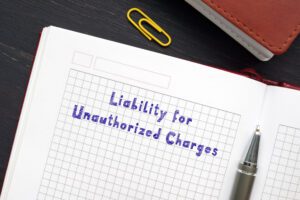
Losing your ATM card is terrifying. It’s even more upsetting if you know someone stole it. It’s equally shocking to find a transaction you didn’t authorize on your monthly bank statement. It leaves you with a feeling of helplessness.
But federal law protects you from losing your money if you are willing to follow a couple of simple steps. If you follow these basic rules, your bank must fully reimburse you for any unauthorized ATM charges in New York City. If they do not reimburse you, an experienced attorney from Schlanger Law Group, LLP could fight for your deserved compensation.
The key thing to remember is to notify the bank within the law’s easy time limits. The Electronic Funds Transfer Act (EFTA) is an iron-clad shield to ensure your bank reimburses you for all the unauthorized transactions as long as you notify the bank within a defined deadline.
If you don’t notify the bank until after the notification deadline lapses, it may cost you. But, even if you do fail to call the bank within the set deadline, there are still limits on the amount for which the bank can hold you responsible.
Here are the basic rules:
If you do notify the bank within the two-day-limit, you can only lose a maximum of $50. If the thief charged $60 or $60,000, your loss would still not exceed $50. If the thief only charged $30, then you would only lose $30.
If you don’t notify the bank of the ATM card’s loss until after you discover it’s missing, then:
Regardless of whether the unauthorized charges involved an ATM/debit card or some other type of electronic transfer, if you don’t notify the bank of unauthorized transactions within 60 days from the day you received your bank statement, then you will be responsible for all your losses, without any dollar amount limitation.
However, this is true only with regard to the unauthorized charges on your ATM card that occurred after the first 60 days and prior to your giving notice to the bank. With regard to losses suffered during the first 60 days, the limits on liability described above would apply.
Congress specifically stated that the 60-day deadline to notify the bank of the unauthorized transactions could be extended for extenuating circumstances, such as if the account holder was hospitalized or engaged in extended travel. These are scenarios Congress used as examples and not an exclusive statement of what circumstances would justify a reasonable extension of the deadline.
If your bank claims that you signed an agreement to be bound by different rules, be assured that they are wrong. Congress enacted a law that applies nationwide and is not subject to any alteration by any bank or state law. The only time a state law or bank rule may apply is if it is even more lenient to the account holder than the federal law.
Not surprisingly, the law does not require the bank to reimburse losses it can prove were authorized by the account holder. Banks may allege that an account holder was somehow trying to defraud the bank by falsely claiming that certain transactions were unauthorized.
The bank has the burden of proof and must show the account holder’s claim is false. It is not up to the account holder to bring proof of innocence. If it suspects fraud or mistake by the cardholder, the bank must conduct a genuine investigation. They must consider whatever evidence or information the cardholder provides.
While a consumer who is trying to defraud the bank is, of course, not protected, a consumer who is merely negligent gets all of the Electronic Funds Transfer Acts protections. So, the fact that the consumer may have been careless in protecting their card, account, or password does not let the bank off the hook – they may be free to decide not to do business with the consumer going
forward, but they cannot refuse to reimburse the consumer on grounds that the consumer “wasn’t careful enough”.
Unfortunately, Banks don’t always reimburse consumers as the law requires. In fact, some banks routinely tell consumers that they are responsible for the fraudulent charges, even when all the evidence points the other way and the bank’s obligation under the law is clear.
Fortunately, the Electronic Funds Transfer Act provides powerful remedies including actual damages, statutory damages, and costs and mandatory attorney’s fees. These claims can be pursued in federal court. And because of the EFTA’s attorney’s fees provisions, consumer law firms that focus on these types of claims, such as Schlanger Law Group, LLP, can represent consumers dealing with unauthorized ATM charges in New York City on a contingent basis and help them recover compensation. Call (212) 500-6114 or fill out this simple contact form to schedule your free consultation.
Schlanger Law Group LLP serves clients in New Jersey, New York, and throughout the United States with consumer protection, class action, credit reporting, and identity theft issues.
Schlanger Law Group In The Media




Reach out to Schlanger Law Group for a free consultation, and let’s discuss your case with no upfront fees.
The information on this website is for general information purposes only. Nothing on this site should be taken as legal advice for any individual case or situation.
This information is not intended to create, and receipt or viewing does not constitute, an attorney-client relationship.
ATTORNEY ADVERTISEMENT | Past Results Do Not Guarantee Similar Outcomes in the Future
This site is protected by reCAPTCHA and the Google Privacy Policy and Terms of Service apply.
WEBSITE BY: VISIONTRACTION